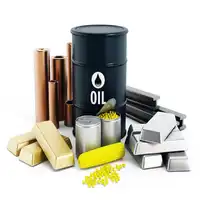Mutual funds, including commodity funds, are regulated to primarily take long positions in trades. While this approach aligns with the prevailing investing culture, it limits their ability to handle situations where prices decline. The commodities market, on the other hand, does not have an inherent bias toward long positions and recognizes the value of both long and short positions.
In commodities trading, there is no inherent long or short side. Participants can benefit from price movements in either direction, as commodity prices fluctuate in both positive and negative directions. Unlike some other investments, commodities trading does not typically involve holding positions over an extended period. The focus is on shorter-term durations, usually less than a year.
Commodities trading primarily involves trading contracts, and many contracts need to be closed out and replaced to maintain a position. Taking a long-term position in a commodity is unusual for commodity traders, whether they are hedgers or speculators. Speculation in commodities markets typically occurs within months, not years or decades.
Investing in commodities does not require trading contracts, and some commodities can be held for longer periods if desired. Commodity mutual funds seek positions that differ from those of futures traders. While futures trading and mutual funds employ different strategies, commodity mutual funds can make sense when investing in commodities that can be held over the long term.

Commodity funds not only invest in commodities themselves but also in the stocks of commodity producers. Stocks can be held over the long term, providing an additional avenue for commodity fund investments.
Commodities Themselves Aren’t Good Long Term Investments
While long-term speculation is not common with commodities contracts in general, some commodities, such as gold and silver, are suitable for long-term speculation due to their durability. These metals can be held by investors as a store of value over extended periods.
Commodities, in general, tend to have lower returns and higher risk compared to more traditional investments like stocks. When investing, individuals typically aim for either higher returns with higher risk or lower returns with lower risk. Commodities often fall into the category of offering both higher risk and lower returns relative to other investments.
If we compare investing in a diversified portfolio of stocks to investing in precious metals, there may be periods where precious metals outperform stocks, especially during bull markets. However, over the long term, stocks tend to outperform precious metals.
From the perspective of long-term capital accumulation, traditional investment vehicles like stocks offer more potential for growth compared to commodities. Therefore, long-term commodity investing may not align with the goals typically associated with investment, which include seeking capital accumulation.
Why Do Commodity Funds Exist Then?
While commodities may have subpar performance compared to other investment options in terms of long-term capital growth, mutual funds that include commodities offer diversification benefits. The purpose of commodity funds is to provide investors with exposure to asset classes beyond the traditional stocks and bonds combination.
Commodities, such as gold, often have lower correlation with stocks and bonds. During major stock market declines, it can be beneficial to allocate a portion or even all of one’s investment out of stocks and into commodities like precious metals. Precious metals, especially gold, have a unique role as a safe haven asset. When the economy faces uncertainty or downturns, investors tend to move their investments into precious metals as a store of value, which can drive up their prices.
The inverse relationship between the economy and precious metals is driven by investor behavior rather than fundamental factors. By investing in commodity funds, investors can potentially hedge against bear markets in the stock market and protect their portfolios. This holds true whether the fund holds the physical commodities or the stocks of commodity producers, as higher commodity prices, such as gold prices, can positively impact the value of related stocks, such as gold mining companies.
In summary, commodity funds offer diversification and can provide a hedge against stock market declines, potentially offering protection and stability to an investor’s portfolio.
The Need For Hedging with Mutual Funds
Mutual funds operate under specific regulations that restrict their trading strategies and limit their ability to take advantage of market declines.
Commodity funds, as a type of mutual fund, can still serve as a hedge against bear markets and economic downturns by providing diversification. By allocating a portion of an investment portfolio to commodity funds, investors can potentially benefit from the performance of commodities that behave differently from traditional stocks and bonds during challenging market conditions.
However, it’s important to note that the effectiveness of a hedge depends on the specific market circumstances and the individual investor’s risk tolerance and investment goals. Holding a fixed percentage of a portfolio in commodity funds regardless of market conditions may not be the most optimal approach.
Ultimately, the decision on how to manage investments and assess risk is up to the individual investor. While some investors may choose to rely on the expertise of mutual fund managers, it’s also crucial for investors to educate themselves about different investment strategies and consider their own risk preferences.
Using Commodity Funds To Hedge Properly
While mutual funds have certain limitations due to their regulatory structure, investors can still make informed decisions about their portfolios and consider alternative investment options, such as commodity funds or inverse commodity ETFs, to manage risk and potentially benefit from market downturns.
Being actively involved in managing one’s portfolio and understanding different investment strategies can provide investors with more flexibility and adaptability to changing market conditions. It’s important for investors to take an active role in their financial decision-making and consider a range of investment options beyond traditional buy-and-hold approaches.
Ultimately, the key is to tailor the investment approach to one’s individual goals, risk tolerance, and market expectations, rather than relying solely on the default allocation of mutual funds.




